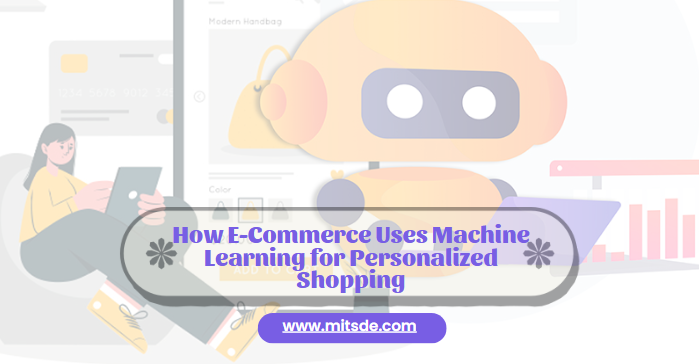
In today’s fast-paced digital world, e-commerce has changed tremendously, with Machine Learning (ML) playing a key role. With the rise of online shopping, businesses are embracing AI-powered technologies to provide personalized experiences to customers. Machine learning in personalized shopping, from AI-driven suggestions to predictive analytics, has completely changed how companies communicate with their customers.
The Role of AI in E-Commerce Personalization
Artificial intelligence (AI) is essential for customizing shopping experiences based on individual preferences. Machine learning algorithms in online retail have allowed firms to examine large volumes of data in order to accurately predict and meet client wants, whereas traditional e-commerce platforms depended on generic product suggestions.
AI-Driven Recommendations in Online Shopping
AI-powered product suggestions are among the most significant uses of machine learning in customized purchasing. Online retailers such as Amazon, Netflix, and Spotify use advanced machine learning algorithms to analyze client preferences based on browsing history, previous purchases, and interactions. These AI-driven recommendations for online shopping improve client satisfaction by displaying products that are relevant to their interests.
For example, a consumer looking for running shoes is likely to see recommendations for similar products like smartwatches, socks, or workout equipment. This strategy improves engagement, lowers bounce rates, and raises sales for retailers.
Customer Behavior Analysis with AI
E-commerce success depends on an understanding of consumer behavior, and firms may learn about buying trends by using AI to analyze customer activity. AI helps brands identify:
- Frequently viewed products
- Preferred price ranges
- Shopping frequency and habits
- Likelihood of making a purchase
Retailers may improve user experience, develop targeted ads, and adjust their marketing tactics with the help of this information, which will increase client retention.
Personalized Marketing Using Machine Learning
In today’s competitive e-commerce world, personalization is essential for success. Using machine learning for personalized marketing entails showing people ads, discounts, and promotions that are specific to their interests and actions. Instead of sending generic email campaigns, businesses may segment their customers and offer tailored promotions that are more likely to convert.
Customers who often buy skincare products, for instance, can get tailored offers on related products. This deliberate strategy increases client loyalty and improves the overall purchasing experience.
Predictive Analytics in E-Commerce
Predictive analytics in e-commerce is another revolutionary development in online shopping. Machine learning algorithms can anticipate future buying trends by examining previous purchases, search history, and browsing behavior. This enables businesses to optimize their inventory, estimate demand, and offer products that customers are most likely to purchase next.
Fashion merchants forecasting seasonal trends is a prominent example. If artificial intelligence identifies a surge in demand for a certain apparel design, shops can stock up on relevant merchandise ahead of time, lowering unsold stock and increasing profits.
Benefits of Machine Learning in E-Commerce
There are several benefits to integrating AI and ML in e-commerce, such as:
- Improved client Experience: Customized marketing and recommendations raise client happiness.
- Enhanced Sales & Revenue: Predictive analytics and targeted promotions increase conversion rates.
- Effective Inventory Management: AI assists merchants in maximizing inventory levels and avoiding shortages or overstocks.
- Fraud Security & Detection: Machine learning techniques stop fraudulent transactions and identify odd activity.
- Automated Customer Support: Virtual assistants and chatbots expedite customer support by cutting down on response times.
How MITSDE is Paving the Way for AI in E-Commerce
Professionals need to arm themselves with AI knowledge if they want to stay ahead in the ever-changing world of e-commerce. MITSDE (MIT School of Distance Education) provides specialist AI courses in Machine Learning, which assist students grasp the role of AI in e-commerce personalization and other applications. Aspiring professionals can uncover limitless potential in this rapidly evolving industry by receiving extensive training in machine learning algorithms, predictive analytics, and AI-powered suggestions.
Conclusion
In order to provide individualized purchasing experiences, e-commerce companies now depend heavily on machine learning. From AI-powered product recommendations to predictive analytics, the usage of machine learning increases consumer interaction, marketing strategies, and promotes increased sales. As AI evolves, staying current on its applications is critical for both organizations and professionals.
🚀 Want to master AI in e-commerce?


